Suchergebnisse für "Factsheet%3A Energietechnologien gestalten%2C die f%C3%BCr alle sinnvoll und nutzbar sind"
Indicators for urban areas – for construction, operation and mobility in climate-friendly areas
Development and coordination of indicators for energy and ecological evaluations of urban areas based on the Swiss 2000-Watt certification system. The results will be used for the development of a quality assurance system for urban areas similar to the klimaaktiv declaration for buildings and the e5 certification for communities.
Smart Grids Showcase Region: Salzburg
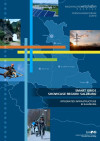
Integratred Infrastructure in Salzburg
Forschungsforum
2/2010
Herausgeber: BMVIT
Englisch, 6 Seiten
Downloads zur Publikation
Edible Seestadt - Green Seestadt - Learning for the Edible City of the Future
"Edible Seestadt" ("Essbare Seestadt") identifies which contributions an edible city provides for a climate-neutral resilient district and how this contribution can be sustainably stabilized and optimized.
Decarbonisation of industry
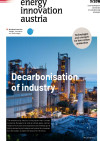
Ways to achieve a zero-emission industry. Innovation is the key for climate-friendly production.
energy innovation austria
3/2019
Herausgeber: BMVIT und Klima- und Energiefonds
Englisch, 12 Seiten
Downloads zur Publikation
Cooling Citites
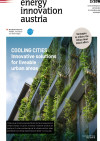
Innovative solutions for liveable urban areas
energy innovation austria
2/2019
Herausgeber: BMVIT und Klima- und Energiefonds
Englisch, 12 Seiten
Downloads zur Publikation
Digital technologies
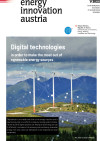
Digital technologies in order to make the most out of renewable energy sources.
energy innovation austria
1/2022
Herausgeber: BMK in cooperation with the Climate and Energy Fund
Englisch, 12 Seiten
Downloads zur Publikation
IEA SHC Task 68: Efficient Solar District Heating Systems (Working period 2022 - 2024)
Regarding the use of CO2-free technologies for local/district heating systems, solar technologies in particular offer an efficient option. In this task, the opportunities and challenges are investigated in order to efficiently provide the required temperatures necessary for local/district heating networks through solar technologies, to promote digitalisation, to identify new business models and measures for cost reduction, and to spread the knowledge about the potential of solar district heating systems.
Feasibility concept for the extensive implementation of information systems on Geographic basis in forest associations
The introduction of spacious information systems on GIS basis (geographical information system) in the forest federations of Austria and Bavaria is examined. This offers for the first time the possibility to connect biological and technical characteristics (attributes) with geographical data to compensate for the disadvantages of small structured forest estates. A substantial goal is also the development of a scanner method for the automated, EDP-supported identification of forests and their most important ground and stock characteristics.
ECR Energy City Graz-Reininghaus: Urban strategies for the new conception, construction, operation and restructuring of an energy self-sufficient city district
The aim is the development of a valid set of specific values and a guideline as a basis for energy self-sufficient district development. Based on the results, a masterplan (energy-network) for the district Graz-Reininghaus shall be developed. Future-oriented "city-building-blocks" will be implemented as flagships of innovation.
SIMULTAN - Simultaneous planning environment for buildings in resilient, highly energy efficient and resource-efficient districts
This project enabled the opportunity for an essential energy efficiency increase within overlapping buildings, to achieve the objective of resilient cities and districts with respect to a high quality of life, resource sustainability and energy efficiency. The goal was a workable tool based on a multidisciplinary planning approach, to support the decision finding process in order to design both refurbishment projects and new developments within a highly efficient city.
Biotope City - construction manual for the green city of the future
"Biotope City" is an overall concept for the implementation of comprehensive urban greening with the aim of using the regenerative mechanisms of nature. With this approach, quality of life is to be comprehensively, sustainably and cost-effectively increased and resilience against extreme weather events in cities will be improved. The project aims to generate realistic components of a "construction manual" for the green city of the future, which are generalizable and transferable.
Salzburg:KanS - Salzburg: Climate-neutral city
Salzburg:KanS aligns the vision and climate protection goals of the city of Salzburg with the climate neutrality targets of the province and estimates the sector-specific CO2 reduction contributions until 2030. Based on these contributions, the project develops implementation strategies for the entire city as well as the focus areas of “climate-neutral mobility” and “climate-neutral neighborhoods”.
IEA SHC Task 67: Compact Thermal Energy Storage Materials within Components within Systems
This Task aims to push forward the compact thermal energy storage (CTES) technology developments to accelerate their market introduction through the international collaboration of experts from materials research, components development and system integration. These technologies are based on the classes of phase change materials (PCM) and thermochemical materials (TCM). Materials from these classes will be studied, improved, characterized and tested in components.
IEA SHC Task 56: Building Integrated Solar Envelope Systems for HVAC and Lighting
IEA SHC Task 56 focused on the critical analysis, simulation, laboratory testing and onsite monitoring of envelope systems entailing elements that use and/or control incident solar energy. The central task was the integration of HVAC and lighting systems into a building’s Solar Envelope solution through a systemic approach.
Verbreitung Von Biomasse Kleinanlagen In Österreich
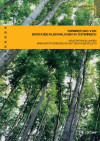
Neue Entwicklungen Brennstoffversorgung mit Biomasse-Pellets
Forschungsforum
3/1998
Herausgeber: BMVIT
Deutsch, 6 Seiten
Downloads zur Publikation
Building innovations from Austria
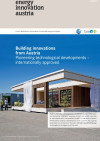
Pioneering technological developments – internationally approved
energy innovation austria
1/2017
Herausgeber: BMVIT und Klima- und Energiefonds
Englisch, 8 Seiten
Downloads zur Publikation
Bridging technologies on the way to a climate neutral future
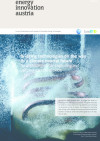
New strategies for capturing and utilizing carbon dioxide
energy innovation austria
4/2017
Herausgeber: BMVIT und Klima- und Energiefonds
Englisch, 8 Seiten
Downloads zur Publikation
IEA ES Annex 49: Low Exergy Systems for High-Performance Buildings and Communities
The objective of Annex 49 is the development of approaches for reducing the exergy demand of buildings, so as to reduce the CO2 emissions of the building stock and support structures for sustainable and reliable energy systems in the building sector. To achieve the objectives of Annex 49, the following activities have been carried out:Application of exergy analysis and providing tools, guidelines, best-practice examples and background information for planners and decision makers in the fields of construction, energy and politics Support of cost-efficient low-energy/exergy measures for renovation and new building taking into account both the residential and the service sector Promotion of exergy-related performance analysis of buildings, particularly from the perspectives of communities / regions
ZERMET - Zero Emission Retrofitting For Existing Textile Plants
Minimisation of the consumption of water, chemicals and energy in the textile industry. Further development of the ZERMEG approach in the form of a questionnaire and application in the textile industry.
ProKlim+ - Use of Model Predictive Control to optimize solar power consumption in case of increased energy efficiency.
Using weather forecast for building automation can help improving the energy efficiency of buildings and, thus, saving energy. In the project ProKlim+ the forecast of solar radiation will be used to optimize the building automation to satisfy the needs of the building users, and at the same time to minimize the energy demand on the one hand and to maximize the consumption of self-produced energy on the other hand.
